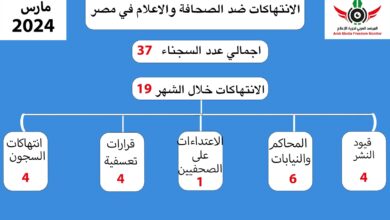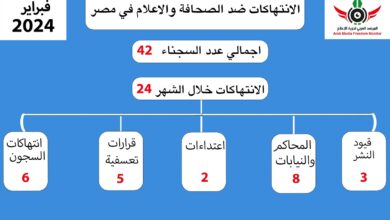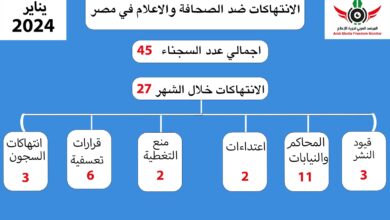World Press Freedom Day2021in Egypt: Fewer releases..More violations
London-1-5-2021
On the world Press Freedom Day, the Arab Media Monitor welcomes the release of 8 Egyptian journalists from Egyptian prisons. But the Arab Media Monitor calls for immediate release of the remaining 70 journalists and photographers who remain imprisoned and are serving various sentences that reach up to life in prison. Most of them are under provisionary detention for pending charges and have not been referred to the courts. They have spent the maximum pre-trial detention periods stipulated by the law (two years) and still were not released. Rather, they were re-imprisoned with new charges, turning provisionary detention, which is merely a precautionary measure, into a long-term punishment that deprives them of their freedom without a court ruling.
Previous reports and statements from Arab Media Monitor have confirmed that these imprisoned journalists and photographers have not committed any terrorist crimes. Their main offense is practicing journalism or exercising their right to peacefully express their opinions, a right guaranteed by the constitution and Egyptian laws. Article 71 of the Egyptian constitution completely prohibits imprisonment in cases that relate to press publishing. It also protects newspapers from being closed.
Arab Media Monitor condemns the reimprisonment of journalists under new cases that circumvent the laws limiting provisional detention to a maximum of two years. This results in recycling old accusations by bringing new charges against them during their imprisonment. Many journalists and photographers have been subjected to this practice despite their serious medical conditions and need for care.
Examples of Cases of Re-Imprisonment:
–The case of Ahmed Abu Zaid Al-Tanoubi (Journalist at Al-Tareeq newspaper), who was released from a court case several months ago. While preparing to leave prison, he was surprised by a ten-year sentence that was issued against him in absentia by a military court during his imprisonment.
–Yahya Khalaf Allah, editor-in-chief of the Yaqeen network, who was arrested 15 months ago (and was previously arrested twice in 2014 and 2015 and was forced to close his network due to persecution).
–Abdullah Shusha, correspondent for the Amjad TV channel, who was arrested since September 2013, and has since been re-imprisoned several times on new charges before being released.
–Similar cases include Hisham Abdel Aziz, a journalist for Al-Jazeera, whose family has been pleading for medical care for his deteriorating eyesight, as well as his colleague on the same channel also Bahaa El-Din Nemat Allah, and journalist Ahmed Subaie, director of the Al-Aqsa TV office in Cairo.
Elderly Journalists Suffer from Severe Medical Conditions in Prisons:
While seventy-years-old journalist Magdy Ahmed Hussein was released during the past few days after serving a seven-year prison sentence, other elderly journalists who struggle with medial conditions remain imprisoned. Journalist Jamaal El-Jamal, who has been detained for more than two months, suffers from severe pain in the neck, spine, and liver disease. Other examples include journalist Amer Abdel Moneim (Al-Shaab newspaper) and Amr Al-Khafif, head of broadcast engineering at the Egyptian Radio and Television Union, who has been imprisoned since 2013, as well as Mohsen Radi and Badr Mohamed Badr, and Hisham Fouad (Al-Arabi newspaper).
Female Journalists Imprisoned for Long Periods
Several female journalists are also among the detainees such as Alia Awad (Rasd Network), Shaima Sami (Arab Network), Doaa Khalifa (Al Dustour newspaper), and Israa Abdel Fattah (Al Tahrir newspaper).
Media and Drama Production Monopoly by Security Authorities:
Egyptian authorities expand their control over the media. They have recently acquired Al Mehwar (a private television channel owned by businessman Hassan Ratib) and Al-Masry Al-Youm newspaper (a private daily newspaper owned by businessman Salah Diab). They were added to the expanding media empire owned by Egyptian intelligence under the United Media Services Company, which includes several satellite and radio channels, newspapers, websites as well as media, film, and advertising production companies.
This domination aims to ensure the publication and marketing of the narrative that is provided by the authorities as they also continue to block more than 500 websites. Over the past few days, the Masr Al-Arabia website, one of the well-known press sites, was forced to terminate its work after being blocked by the Egyptian authorities for three years.
The State control and hegemony has extended to the field of drama production, which has been evident during the current month of Ramadan. This has been possible through “Synergy”, which is a media production company that is affiliated with the Egyptian Intelligence Services. Additionally, Egyptian authorities have imposed restrictive codes on all media production companies and media outlets. Such codes prohibit any negative portrayal of members of the Egyptian army and police. Such hegemony over media production and distribution aim to impose the narrative of events from the perspective of the Egyptian authorities, especially after the July 3, 2013 coup. The current administration seeks to distort the image of the January 25, 2011 revolution and portray it as a foreign conspiracy even though the current Egyptian constitution acknowledges this revolution.
Finally, on the World Press Freedom Day, Arab Media Monitor renews its demand for the Egyptian authorities to release the remaining imprisoned journalists. It calls for the authorities to uphold constitutional provisions that guarantee freedom, independence, and diversification of the press. Arab Media Monitor condemns blocking websites and the expanding security dominance and control over the media and drama production.




